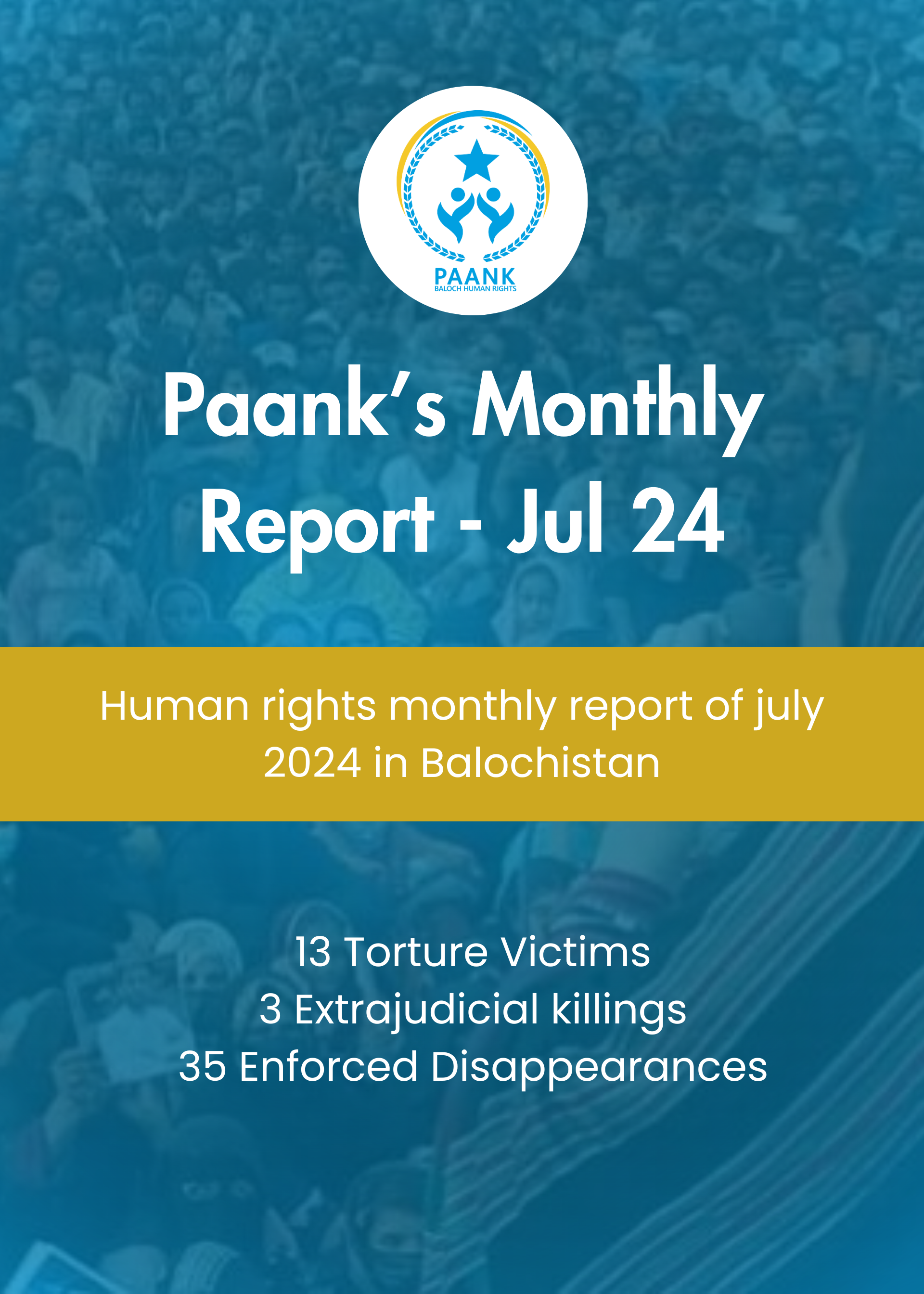This investigative report examines into critical human rights issues plaguing the region of Balochistan, focusing on enforced disappearances, extrajudicial killings, and horrifying road accidents and the accusing of Pakistani Govt official to the previous forcibly disappeard people to involve in false terrorist cases without and kid of proofs. Through rigorous data collection and field investigations, this report aims to shed light on the concerning trends and challenges faced by the Baloch people.
Key Findings
- Extra judicial killings
- Enforced Disappearances
- Road accidents
- False cases and accusation by the Govt official to the previous forcibly disappeared people
Human Rights Report on Balochistan – July 2024
The human rights situation in Balochistan in July 2024 remains dire, characterized by severe violations, including enforced disappearances, extrajudicial killings, and aggressive suppression of protests. The following report outlines the key events and ongoing issues affecting the region.
Enforced Disappearances
Baloch National Movement’s human rights organization, “Paank” released an investigative report detailing the continuous human rights violations in Balochistan. The report highlighted that in July 2024 alone 35individuals were forcibly disappeared by the Pakistani military from various districts across Balochistan. This trend of enforced disappearances has become a persistent and alarming issue, with families often left without information about the whereabouts or condition of their loved ones.
Extrajudicial Killings.
The situation in Balochistan has been marked by widespread atrocities carried out by the Pakistani military and associated armed institutions. These include not only enforced disappearances but also acts of torture, the destruction of property, and looting. A particularly disturbing aspect of this violence involves the abduction of young men, who are then subjected to brutal torture in detention centers and often killed, with their bodies discarded in public spaces to serve as warnings.
Despite growing protests against these human rights abuses, the military’s response has been increasingly brutal. In Gwadar, for example, violent crackdowns on unarmed protesters resulted in 3 deaths and more than hundreds injured. The Pakistani authorities also imposed communication blackouts, shutting down internet and mobile networks in key areas such as Gwadar, exacerbating the isolation and vulnerability of the local population.
Protests and Sit-ins Against Enforced Disappearances.
In response to the rising tide of enforced disappearances, protests and sit-ins have erupted across major cities in Balochistan. One significant protest occurred on June 28, 2024, when the family of Zaheer Baloch, who had been forcibly disappeared after being arrested by the Counter-Terrorism Department (CTD) police, set up a protest camp on Saryab Road in Quetta. Despite several days of peaceful demonstrations, authorities failed to engage with the protesters. Eventually, a large rally was held in Quetta, where the police responded with force, using live ammunition and tear gas against the demonstrators. Many protesters, including women, were arrested and charged with serious offenses.
In Turbat, located in the Makran division, hundreds of families braved extreme heat to protest the disappearances of their loved ones. Temperatures during the protests ranged between 48 to 50 degrees Celsius, yet no action was taken by the district administration or the provincial government to address the protesters’ demands. A particularly violent incident occurred on July 19, when the CTD police and government-armed militias conducted a joint operation in the Greshah area of Nal tehsil in Khuzdar district. The village of Kocha was besieged, resulting in the injury of three women and the enforced disappearance of six individuals. The local population responded by blocking the CPEC M8 link road in protest. Although the district administration promised the release of the detainees, they have yet to be recovered.
These incidents reflect a systematic effort to suppress dissent and silence the voices of those seeking justice, further deepening the atmosphere of fear and repression in the region.
Suppressive Actions by Pakistani Forces.
On July 28, 2024, the Baloch Yakjehti Committee organized a gathering in Gwadar to prot est against the ongoing human rights violations, including enforced disappearances and extrajudicial killings. Despite the peaceful intent of the gathering, the Government of Balochistan opposed the event, issuing threats against those who planned to participate.
As the march proceeded, it was met with severe violence by Pakistani forces in various locations, including Mastung, Hub Chowki, and Turbat. In Mastung, 14 protesters were injured, with one participant, Abdul Muteeb Baloch, sustaining a critical head injury. In Turbat, 25 protesters were injured by direct fire from security forces, resulting in the death of Asghar Baloch. The situation escalated further in Gwadar, where the Frontier Corps (FC), CTD police, and intelligence agencies used live ammunition, tear gas, and batons against the protesters, leading to the death of a young man and injuries to several others.
During these protests, the authorities imposed communication blockades and road closures across three districts: Gwadar, Turbat, and Panjgur, effectively cutting off the region from the outside world and further intensifying the human rights crisis.
Conclusion.
The human rights situation in Balochistan in July 2024 has deteriorated significantly, with widespread reports of enforced disappearances, extrajudicial killings, and brutal suppression of protests. These actions not only violate Pakistan’s own constitution but also international human rights laws. There is an urgent need for international intervention to hold the Pakistani state accountable for these egregious violations and to ensure that the fundamental rights of the Baloch people are protected.
Statistics of Enforced Disappearances
The following districts reported cases of enforced disappearances and illegal detentions in June 2024:
| District | Cases |
|---|---|
| Kech | 8 |
| Awaran | 7 |
| Khuzdar | 6 |
| Mastung | 2 |
| Quetta | 10 |
| Qalat | 3 |
| Gwadar | 3 |
| Kharan | 5 |
| Karachi | 5 |
| Total Cases | 49 |

